Interpretation: A Bible Commentary for Teaching and Preaching | INT (43 vols.)
Digital Logos Edition
Overview
Interpretation: A Bible Commentary for Teaching and Preaching offers a full interpretation of the biblical text, combining historical scholarship and theological purpose. It brings an understanding of what the text says into dialogue with the critical questions and problems of contemporary life and faith. Interpretation revives the neglected art of expository writing that explains the books of the Bible as the Holy Scripture of a church active at worship and work. Teachers, preachers, and all serious students of the Bible will find here an interpretation that takes serious hermeneutical responsibility for the contemporary meaning and significance of the biblical text.
The commentaries deal with whole portions or sections of text that are used in teaching and preaching rather than with individual verses and words. Exegetical study and hermeneutical reflection are integrated into one readable expository essay. Each volume of this series clarifies the sense of the text’s language in its literary-historical context and reflects on the meaning of the text in light of its use in the liturgy and the theology of the church. Each suggests ways in which the text addresses faith and life today.
Each biblical book is presented for its most effective use by teacher or preacher, taking into consideration its central purpose, its use in the liturgical and confessional tradition and in lectionaries, and its special significance for Christian ethics and theology.

- Full-length commentaries on the Old and New Testaments
- Each writer was chosen for their outstanding record of publication and scholarship
- Each volume contains a detailed introduction by the author
The Interpretation series from Westminster John Knox Press is clearly established as a rich source for teaching and preaching. They have tapped the talents of a varied and esteemed group of contributors, resulting in what is clearly the essential comprehensive commentary series on the Bible.
—W. Eugene March, A.B. Rhodes Professor of Old Testament Emeritus at Louisville Presbyterian Theological Seminary
The Interpretation series is an invaluable resource for any leader or scholar interested in interpreting the biblical text to the broader church. Its works are essential for pastors, educators, and church libraries.
—Brian K. Blount, President and Professor of New Testament at Union Theological Seminary
- Title: Interpretation: A Bible Commentary for Teaching and Preaching
- Publisher: Westminster John Knox Press
- Volumes: 43
- Pages: 9,557
This title is included in the following collections
You can save when you purchase this product as part of a collection.
Logos 7 Methodist & Wesleyan G...
$849.99$849.99Logos 9 Methodist & Wesleyan G...
$849.99$849.992025 Wesleyan Platinum
$1,499.99$1,199.99Logos 8 Lutheran Platinum Lega...
$1,499.99$1,499.99
- $1,499.99
- $1,499.99
- $1,499.99
- $1,499.99
- $2,999.99$2,249.99
- $2,999.99
- $2,999.99
- $2,999.99
- $2,999.99
- $2,999.99
- $3,999.99$3,399.99
- $4,749.99$3,562.49
- $4,749.99
- $4,749.99
- $4,749.99
- $4,749.99
- $4,749.99
- $4,749.99
- $4,749.99
- $10,999.99$8,249.99
- $11,399.99
- $23,999.99$17,999.99
- $21,749.99
- $24,999.99
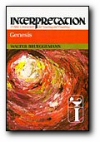
In his clear and readable style Walter Brueggemann presents Genesis as a single book set within the context of the whole of biblical revelation. He sees his task as bringing the text close to the faith and ministry of the church. He interprets Genesis as a proclamation of God's decisive dealing with creation rather than as history of myth. Brueggemann's impressive perspective illuminates the study of the first book of the Bible.
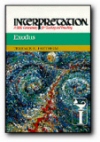
The introduction to this book recognizes Exodus as a Christian book, although it respects its pre-Christian roots in the Hebrew Bible. The commentary then moves in a straightforward manner to review issues of faith and history, the critical and theological tasks of a commentary, and other leading theological concerns. Terence Fretheim gives special treatment to the significance of the hardening of Pharaoh's heart, the relationship between law and narrative, and the shaping of literature by liturgy. This volume highlights, in a unique way, the theology of creation in Exodus.
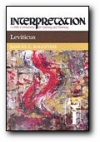
This volume in the popular Interpretation series presents the book of Leviticus. It focuses on the history of Israel during this time when Israel's life was marked by the various ritual sacrifices and observances commanded by God for the ordering of the nation's life.
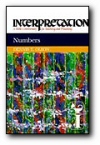
The book of Numbers is the story of the people of Israel in the wilderness as they departed from slavery in Egypt to the freedom of the promised land of Canaan. It contains a variety of materials relating to this transition from the old generation of Israel to the new, including stories and laws, census lists, instructions for worship, reports of military battles, and accounts of legal disputes. Numbers chronicles a community faced with many competing interests, groups, and issues, endeavoring to define itself and its mission in the world. Dennis Olson offers readers a comprehensive interpretation of this often overlooked book. He provides a thoroughly contemporary reading of Numbers that enlightens the modern church as it navigates the contemporary wilderness of pluralism, competing voices, and shifting foundations in the journey toward the twenty-first century.
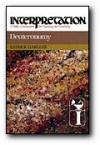
In this theological exposition of Deuteronomy, Patrick Miller is sensitive to the character of the book as a part of scripture that self-consciously addresses different generations. He discusses the nature and character of the law as revealed in Deuteronomy, as well as the nature of the moral life under God. The treatment of Deuteronomy in the New Testament, and customary introductory issues such as authorship and date, are dealt with in terms of their significance for interpreting and understanding Deuteronomy's character and intention.
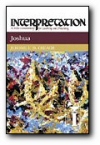
This commentary clearly presents the episodes in the book of Joshua as the people of Israel face the challenges of entering into the land of promise. Both the historical and theological meanings of the book are presented throughout this most helpful commentary.
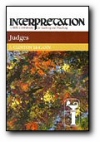
In this striking commentary, McCann interprets Judges for the church and for the present time. The book shows that when we do not worship and serve God, the results are destructive and ultimately deadly. The story of the book of Judges is the story of a long deterioration in Israel's history when its leaders and people continued to turn away from God and worship false gods or idols. The painful lessons of this unfaithfulness were destruction, time and time again. Yet McCann contends that the book of Judges provides a warning grounded in hope. While Israel experienced the destructive results of its disloyalty and disobedience, it also experienced a God who is utterly faithful—even to a faithless people. The book of Judges is a call to repentance from injustices and abuses that result from self-assertion, idolatry, and the refusal to submit to God's will and ways.
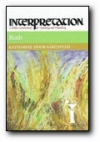
Ruth is one of "the little books of the Bible," only four chapters long. Katharine Doob Sakenfeld has written a commentary of unusual sensibility and discernment that makes very clear why this book has such great importance as literature and as scripture. Ruth is a very human book; its subject matter is the stuff of everyday life: family, marriage, children, homes, food, departures, deaths, good times, and bad times. The narrative is a drama of ordinary human affairs, but the drama unfolds against a background of the providence and purposes of God. In this excellent commentary Sakenfeld does justice to both the human and divine dimensions of the text. Her interpretation is both sociological and theological, a synthesis reflective of the simple profundity of the story itself.
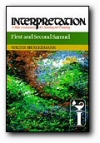
With critical scholarship and theological sensitivity, Walter Brueggemann traces the people of God through the books of Samuel as they shift from marginalized tribalism to an oppressive monarchy. He carefully opens the literature of the books, sketching a narrative filled with historical realism but also bursting with an awareness that more than human action is being presented.
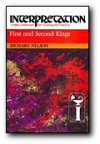
Richard Nelson examines the books of Kings and treats the text as theological literature, emphasizing the literary impact of this important part of the Old Testament canon. Nelson recognizes Kings as a useful though uncritical source of historical information, its purpose to transform the beliefs of its first readers, to get them to re-evaluate their identity before God. Nelson’s impressive volume speaks to the concerns of the twentieth century church as addressed in this ancient Jewish historiographic work.
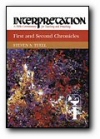
This volume provides a contemporary, scholarly interpretation of the books of First and Second Chronicles, Old Testament writings that are often overlooked and seldom preached upon or studied in churches. Steven Tuell shows how the books of Chronicles present the revelation of God's plan and purposes through the history of Israel, emphasizing the important role that King David plays within that story. Using up-to-date scholarship, Tuell focuses on the theological message of these books—that the purpose of life is to seek God, that those who find God's will and live accordingly will experience blessing, and that God's presence is found in the events of ordinary life.
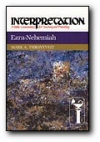
Studies in the books of Ezra–Nehemiah have tended to become bogged down with such questions as, Who came first, Ezra or Nehemiah, and were they contemporaries? When did Ezra make his journey to Jerusalem, how many trips did he make, and which route did he take? In this commentary, the author undertakes a theological reading which emphasizes its character as narrative and story. He avoids rearranging the text and, with the exception of chapter five of Nehemiah, he seeks to understand the narrative as it was received. In general, Mark Throntveit avoids an overly historical approach to the text and presents a clear picture of Ezra and Nehemiah.
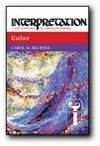
This excellent commentary is a clear and helpful guide for studying the book of Esther. While Esther is often neglected by Christian preachers and teachers, its message continues to be of importance in the present day. This useful resource will provide insight to help us understand and appreciate God's work through the life of Queen Esther. The drama of the book is clearly captured in this superb commentary where Bechtel expertly explores the historical setting, literary structures, and theological themes that emerge in the book of Esther. Theologically, the book shows us the importance of proportion or balance in life, the challenge of living a faithful life in the midst of an unfaithful culture, and the power of the written Word.
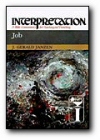
J. Gerald Janzen examines the text of the Book of Job as a literary text, within the context of the history of the religion of Israel and within the broader context of the universal human condition. He approaches the basic character of the book from a literary perspective which enables him to identify human existence as exemplified in Job and to expound on the mystery of good and evil, which gives human existence its experiential texture and which together drive humans to ask the same kind of questions asked by Job.
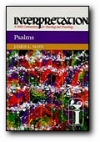
The Psalms have been at the center of Christian faith and piety for centuries. Now, one of the foremost interpreters of the Psalms explores how they can still claim that place today. In this commentary, James L. Mays sets forth what the Psalms say about God, creation, humanity, and the life of faith. Mays proceeds with an awareness that the Psalms were originally composed for worship, and so he provides an understanding of the Psalms as praise and prayer. Individual psalms are treated in one of two ways: either in a concise, descriptive fashion or in the form of expository essays. Those receiving fuller treatment consist of Psalms that are prominent in the practice of worship, those that are used in the New Testament, those that are most important to the theology of the church, and those that shed the most light on the Psalter as a whole. One of the few single-volume commentaries on the Book of Psalms, this commentary should remain a standard reference for pastors and teachers for years to come.
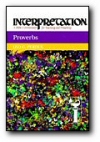
The book of Proverbs is a collection of sayings, poems, and "life's little instructions." Wrestling with the values of things such as creation, livelihood, or moral character, Proverbs exhorts its readers to seek the higher ideals—knowledge, discipline, piety, and order—and offers guidance on how to live in harmony with God, others, and oneself. Perdue’s commentary divides Proverbs into eight separate collections, and clarifies the major historical, social, literary, theological, and ethical elements in this thorough interpretation.
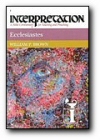
Ecclesiastes is a collection of sayings traditionally attributed to Solomon and deemed by some the strangest book in the canon. It comprises an unusual blend of autobiographical references, theological reflections, philosophical musings, and proverbial instructions, all probing the seeming pointlessness of human striving. Brown explores the text as it engages our own culture's era of questioning and proverbial instructions, all probing the seeming pointlessness of human striving. Brown explores the text as it engages our own culture's era of questioning and search for self full-fulfillment.
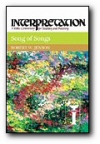
In this volume, Robert Jenson offers a systematic theologian's careful reading of the Song of Songs, also known as the Song of Solomon. Jenson focuses on the overt sense of the book as an erotic love poem in order to discover how this evocative poetry solicits a theological reading. Jenson finds a story of human love for God in this complex poetic book and offers a commentary that elucidates and inspires.
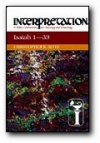
This unique commentary allows the interpretation of Isaiah 1-39 to be guided by the final form of the whole book of Isaiah. It focuses on the theological aspects of Isaiah, giving special attention to the role of literary context. Christopher Seitz explores structural and organizational concerns as clues to the editorial intention of the final form of the material, which he argues is both intelligible and an intended result of the efforts of those who gave shape to the present form of the book. He speaks of the "presentation" of Isaiah (the way in which the prophet and his message have been shaped for posterity), and shows how many structural indications provide clues to interpretation. Seitz casts light upon the larger shape of the entire book of Isaiah.
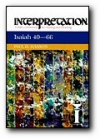
The latter half of the sixth century B.C.E. found the Jewish community fragmented and under great strife after having been conquered by the Babylonian armies. As a response to a growing despair over life in servitude and exile, Isaiah 40–66 was written. Paul Hanson examines the writings of Second Isaiah. What he discovers is a poetic argument for a loving and attentive God and the rightful place of God's creatures in the unfolding of history. This commentary provides a wealth of insight into the world and worldview of Second Isaiah.
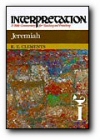
This critical assessment of the Book of Jeremiah enables the reader to rediscover many of the most profound and relevant features of Jeremiah's message and of the agonies and fears of those to whom it was first given. The picture that emerges of such a prophet is an intensely moving one, often at variance with the conventional image of earlier popular reconstructions. Having witnessed the loss of most of the treasured and revered religious support of his day, Jeremiah discovered that the only secure foundation of hope is in God.
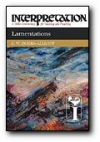
In the face of suffering, agony, and the brutal realities of life; in the midst of divine silence and human pain, the Lamentations poems speak of faith and trust in God. This sophisticated yet accessible commentary makes the message of Lamentations come alive. All who preach and teach will benefit from this rich resource.
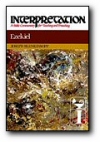
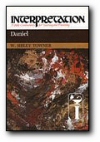
W. Sibley Towner’s in-depth commentary on Daniel is a practical resource for understanding this important book of the Bible. Towner explores the six Diaspora stories about Daniel, the three apocalyptic visions Daniel has, and the prayer of Daniel. Towner also provides observations on the structure and authorship of Daniel, and includes an important essay on why it is important to read the Book of Daniel.
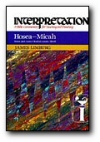
James Limburg introduces the first six (Hosea, Joel, Amos, Obadiah, Jonah, Micah) of the minor prophets and provides a commentary that relates to today's world. He demonstrates why attention should be given to the words of these prophets as they communicate the word of God.
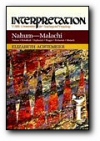
Elizabeth Achtemeier examines the often-neglected Minor Prophets and explains them as they reflect the church at worship and at work. She sets the Minor Prophets in their canonical context emphasizing the relationship between the message of these prophets and the New Testament. Unique in the use of brief quotations from great preachers' sermons on the prophets, Nahum-Malachi is enriched with the vast insightful store of homiletical interpretation available today.
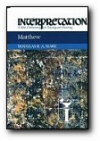
The Gospel of Matthew is treasured as the Gospel of the Sermon on the Mount, and Jesus' teaching sets it apart from the other Gospels. It is precious to generation after generation of Christians because of its fusion of gospel and ethics, of faith and morality.
The commentary proceeds unit by unit, rather than verse by verse, to emphasize what each passage of Matthew means to the author of the Gospel and the modern church. Douglas Hare shows that the purpose of Matthew's writing is to convince Christians that a genuine faith in Christ must be demonstrated in daily obedience and that faith and ethics are two sides of the same coin. According to Hare, the turning point in Matthew is the narrative of Peter's confession and the subsequent passion announcement. His commentary stresses the close connection between the Great Commission, with which the Gospel closes, and the moral imperatives of the Sermon on the Mount.
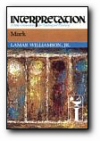
First gospel or not, Mark is surely the only New Testament book which calls itself a gospel. "The beginning of the gospel of Jesus Christ, the Son of God" is the title of this work, and its self-designation ought to shape any interpretation which respects the text.
"Gospel" can signify a literary genre, or a particular theological message, or a canonical writing normative in the life of the church. The Gospel of Mark is all three: a collection of traditions about Jesus presented in story form, a narrative constituting good news about God and his kingdom, and a writing which occupies a place of fundamental importance in the Scriptures of the church.
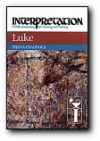
Using Luke's own prologue as the guideline for this commentary, Fred B. Craddock calls attention to the continuities between Jesus and his heritage in Judaism and the church after him. Evidence is provided by the frequency of echoes from the Old Testament and by Luke's clear assumption that the reader is familiar with the book of Acts.
While attending to the text of Luke, Craddock provides an awareness of other sources about Jesus. He includes thoughts from other researchers into this Gospel and, since Luke is an "orderly account," gives special attention to the sequence of the narrative. Like Luke, Craddock assumes the reader is not only a believer but also a leader in the community of faith.
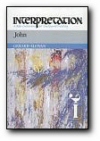
Gerald Sloyan utilizes the lectionary approach to offer new insight into understanding the book of John. By doing this, he puts the Fourth Gospel in the Old Testament context within which the early church received the public readings of this Gospel. His emphasis on the use of John within first-century Christianity enables modern readers to grasp the meaning of the Gospel message.
Presupposing the historical and philological work of other scholars, Sloyan focuses rather on the meaning of the Forth Gospel for the church. He emphasizes the ecumenical demonstrated in his treatment of John 17. Particularly helpful is Sloyan's view of the conflict between Christians and "hoi Joudaioi." Since we do not know who the "hoi Joudaioi" were, Sloyan avoids the rendering "Jews" and thereby corrects any anti-Jewish misreading of this Gospel.
While Sloyan keeps in context both Jesus in his lifetime and the twentieth-century church, he steadfastly concentrates on the work of John's final editor within first-century Christianity. Interpreting John as "a book of the church" gives teachers and preachers valuable perspective on the Fourth Gospel.
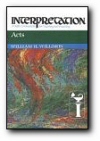
William Willimon combines the latest findings in Lukan scholarship with the pastoral, educational, and theological concerns of the local church to provide a new interpretation of Acts. He bases his comment on the idea that the purpose of Acts was not to make Christianity acceptable to the Roman states but rather to preserve the integrity of the church against the onslaught of classical culture.
Taking his interpretive task seriously, Willimon applies exegetical insight to problems within contemporary society and the local church. He works from the assumption that Acts addresses the church in its struggles with its own message, internal coherence, integrity, and relationship to the surrounding social and political order.
Willimon's lively and direct style is evocative and suggestive to the contemporary preacher and interpreter of Acts. He divides the text into various thought segments, discussing each segment in short essay form. His method, design, outline, and presentation offer a most insightful interpretation of the book of Acts.
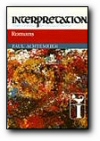
Paul was on fire to preach the good news of the gracious lordship of God expressed in Jesus Christ, and nowhere more so than in Romans. Because God as creator is Lord over the whole of created reality, reflections on that lordship encompass the full range of human problems, and nowhere is that more the case than in Romans. Paul deals with problems as contemporary as tomorrow's newspaper. They are problems as global as the headlines and as intimate as those discussed in "Dear Abby." The fate and future of the Jewish people, the role of the individual in the total sweep of history, the responsibilities of the citizen to the government of the country with which he or she may not always agree, the morality of actions in which adults engage, sexual and otherwise—all these and more occupy Paul in his letter to the Christians in Rome. It could not have been otherwise, because a letter to Rome was a letter to the political, military, and economic capital of Paul's world; and he could no more avoid such problems than could a Christian author in our day writing to Christians in Washington, D.C. One may come to Paul's letter to the Romans therefore with great expectations.
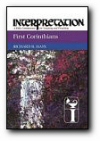
Paul's first letter to the Corinthians was addressed originally to a fledgling mission church in Corinth. Paul's absence from the church had allowed serious problems to arise within the Corinthian community, but the problems that he addresses in this letter do not always seem based in explicitly theological ideas. The brilliance of Paul, though, is that he frames the issues theological terms and reflects on them in the light of the gospel.
Hays identifies and discusses the major theological themes of the letter, as well as issues such as community formation and the rethinking of inherited socio-cultural norms and practices, and he offers Paul as a model for ministry.
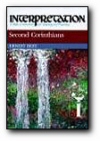
Although Corinth was an ancient Greek city, it had been totally destroyed by the Romans in 146 BC, and the site lay unused for about a hundred years. It was then rebuilt by Julius Caesar as a Roman city and became the seat of government of the Roman province of Achaia. Like most major cities of the ancient world it contained a considerable number of Jews. It was among these that Paul, in accordance with his normal practice, began his mission (Acts 18:4). Corinth is often described as an exceptionally licentious city, but most of the evidence for this relates to the earlier Greek city and not to the Roman. In Paul's day it was probably no worse or no better than any large cosmopolitan area. While some passages in First Corinthians refer to its sexual immorality, this is not an important factor in Second Corinthians. What Paul writes in this letter has little to do with immediate local and external circumstances but much with the internal life of the Christian community in Corinth.
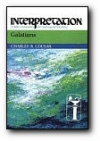
Paul's letter to the Galatians has had an impact on the life and thought of the Christian church far exceeding its modest length. Though less than 150 verses (compared to more than 1000 in Acts, nearly 870 in the Gospel of John, and 303 in Hebrews), it has exercised a profound influence on theologians struggling with the issues of freedom and faith, gospel and law, the Spirit and ethics. In the second century when Marcion developed his controversial canon of NT books, he divided it into two sections: Gospel and Apostle. Galatians, for theological reasons, headed the list in the latter section. During the patristic period commentaries on Galatians seem to have been more numerous than on any other of Paul's letters. The influence of the epistle on Martin Luther is well known. He found it immediately relevant to the situation of the church in the sixteenth century and wrote unquestionably the most influential commentary on the letter. John Calvin took an interest in Galatians, too, but his commentary is less a theological treatise and more a practical exposition of the text.
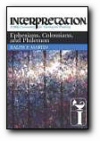
"The Captivity Letters are a rich deposit of Christian truth, waiting to be excavated and used in the church's ministry," says Ralph Martin. In his commentary, he singles out two themes that are high on today's agenda of theological and practical inquiry and planning. These themes are the cosmic dimensions of Christological teaching and the role of the church as God's locus and agent of reconciliation. In this examination, the author allows Paul's voice to be heard on these important issues.
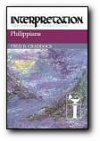
In this commentary, Fred Craddock focuses on the text of Philippians rather than on conversations among scholars about the text. He begins by exploring the importance of Philippians as a letter of Paul to a particular church. His commentary on the text differs from many other commentaries in that issue of authorship, date, place of writing, integrity, or purpose are dealt with at points where the text itself raises these issues. In order to assist those who preach, Craddock gives special attention to passages that appear in most lectionaries. Further, he draws attention to the theology of Paul as reflected in all of his letters wherever it enlightens or is enlightened by the text. Craddock helps the reader understand what it meant for an apostle and a church to be partners in the gospel.
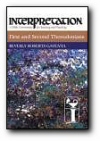
The two epistles to the Thessalonians are a study in contrasts. A comparison reveals considerable similarities of structure and language, but differences in tone and content. The most important concerns of the first letter all but disappear in the second, and minor concerns of the first letter increase in intensity in the second. Even when issues and concerns are shared by both, 2 Thessalonians seems at odds with comments in 1 Thessalonians. In this brilliant commentary, Beverly Roberts Gaventa discusses the issues central to each epistle, identifying what makes each book important for the life of the church today, as well as for preachers and teacher.
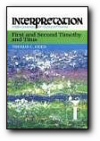
Thomas C. Oden provides a modern commentary on the pastoral letters grounded in the classical, consensual tradition of interpretation. He depends on the writers Athanasius, John Chrysostom, Augustine, Jerome, Luther, Calvin, Henry, and Wesley. His underlying conviction is that these classical Christian exegetes are better interpreters of the pastorals, not simply because they were earlier but because they were more attentive to a received tradition of consensual exegesis and less distracted by speculative theories.
Oden utilizes the best, most accurate research concerning the historical, literary, and philological aspects of the pastoral letters. He addresses tough issues: the role of women in worship, problems of rich and poor, the relationship between servants and masters, policies concerning support of elderly widows, and how to handle church disruptions.
The book is organized in a systematic sequence, making the letters more accessible and useful for thematic preaching. It features otherwise unavailable information and insight on the events and thoughts of the apostle Paul at the close of his life.
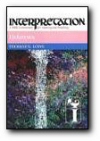
The epistle to the Hebrews is a sermon of the sort preached in the earliest Christian churches. The preacher is addressing an urgent problem, one that is still common today, the congregation is exhausted; it has gone through great distress; and it is having difficulty holding on to its faith. The people are weary and disheartened. Thomas Long shows how the epistle to the Hebrews combines theological teaching and advice about ethical action to speak to the church today as it confronts and responds to today's challenges.
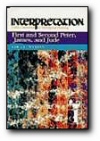
First and Second Peter, James, and Jude have existed on the edges of the canon throughout the centuries. In this volume, Pheme Perkins casts light on these often neglected writings, ably demonstrating that they have, in fact, much to offer to today's readers.
The epistles are more than a compilation of traditional material. They are concerned with very specific and concrete issues facing the early Christian communities and offer a counterpoint to the letter of Paul. They deal with issues such as how to conduct oneself with others, how to live in a non-Christian world, and how to "shepherd the flock of God," as well as with theological issues such as the early Christian understanding of God, the relationship between faith and works, prayer, and suffering. Teachers, preachers, and others will find much intriguing material here as they rediscover the world of the first Christians through these letters.
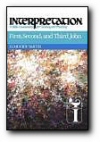
Commenting on First John, Martin Luther made this eloquent and true statement: "This is an outstanding Epistle. It can buoy up afflicted hearts. Furthermore, it has John's style and manner of expression, so beautifully and gently does it picture Christ to us."
Modern critical studies have often presented the Gospel and Epistles of John as the capstone of the development of theological and ethical thought within the New Testament because these writings reach exalted heights through simple language and style. But they are not without ambiguity and obscurity. Because they were written so long ago, situations familiar to the author and readers of that time may be unknown to modern people. Much of what the author and readers in the past shared went unstated in the writings.
This careful and thoughtful book unlocks the door to the theological and ethical treasures contained in the Epistle of John. It is an invitation to a journey of discovery, from the well known and familiar to the less familiar but rewarding.
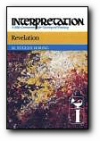
Eugene Boring addresses the issue of how thinking Christians who want to live faithfully and responsibly in today's world can hear the Word of God in Revelation. He explores the meaning of Revelation as an example of Christian prophecy, emphasizing the central phenomenon of Revelation, which is the risen Jesus Christ speaking to his churches through the Spirit. The message should not be obscured by the violent language and vivid imagery or bizarre-sounding content. We must not leave the interpretation of Revelation to the sensationalizers.
Revelation has had enormous influence on religion, and culture. It has an urgently needed message for the contemporary church. Boring's clearly written interpretation enables us to hear, interpret, and understand that message. Understanding this message equips Christians for life in the tumultuous present in the light of God's redeeming act.
Reviews
14 ratings

Alessandro
10/14/2022
Randy
7/21/2022
I purchased the volume on 2 Samuel to get a taste for this set. Regarding the incident where David inquires about the famine, then allows the Gibeonites to request the death of seven of Saul's sons, the author writes, "I suggest then that the narrative intends to be ironic. It intends to show that David is indeed a ruthless opportunist who has found a way to eliminate the Saulide threat, and to do so in the guise of religious legitimacy and political necessity. The accusation of Shimei (16:8), that David shed Saulide blood, is perhaps linked to this narrative." Thus, the author of this volume claims David fabricated the message from God about the cause of the famine, to justify violence against the house of Saul. He uses this as a platform to accuse David of not being the pious king he was portrayed to be in preceding chapters. This would seem to undermine both Scripture as being God's word, and the character of David. We know who the accuser of the brethren is, and who has been trying to undermine God's word since Genesis. That's evidently the inspiring source for this commentary's interpretation. Brueggemann, W. (1990) First and Second Samuel. Louisville, KY: John Knox Press (Interpretation, a Bible Commentary for Teaching and Preaching), p. 337.Leon Porter
4/30/2022
Philemon Schott
1/10/2022

Daniel Thueson
11/12/2020
Kay Lester
4/21/2020

Daniel Caballero
12/21/2019
A great short, but deep, introduction to the key theological themes in a passage. Ideal for those who preach regularly.
Joi Ketcham
12/7/2019

Dion Forster
4/10/2019
I own the New Testament set, and some selected volumes from the Hebrew Bible set. These commentaries are an exceptional resource for both scholarship and preaching.